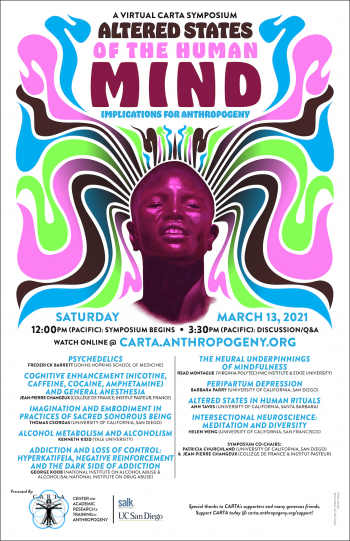Altered States of the Human Mind: Implications for Anthropogeny
Patricia Churchland, University of California, San Diego
Jean-Pierre Changeux, Collège de France & Institut Pasteur
Summary: An earlier CARTA Symposium addressed naturally occurring extraordinary variations of the human mind, and the lessons for Anthropogeny. In this companion symposium, experts will address altered states of the mind that are deliberately induced by humans. We will address what is known about origins and mechanisms of these mind-altering practices, and also (when known) how they affect the minds of other species. In doing so, we hope to gain new insights into the origins and workings of the human mind.
This CARTA Virtual Public Symposium was underwritten by Ben Cipollini (PhD '14, an alumnus of the Graduate Specialization Track in Anthropogeny, University of California, San Diego Department of Cognitive Science) with additional support from CARTA Patrons Ingrid Benirschke-Perkins and Gordon Perkins, Elizabeth Lancaster and Eli Shefter, and new CARTA Friend, Kathlyn Furr.
Media for each talk can be played by clicking on icons in the table below, or by clicking on the individual talk titles below and then the attachment file at the bottom of the page.
| Speakers | Media | Session |
|---|---|---|
 Pascal Gagneux |
|
Welcome |
 Frederick Barrett |
|
Psychedelics Psychedelic drugs such as psilocybin and LSD have re-captured the imagination of both popular society and modern science. We will briefly review the history of psychedelic research and sample current empirical knowledge regarding the acute effects of classic psychedelic drugs on perception, cognition, emotion, and brain function. We will then briefly review the potential therapeutic efficacy of psychedelic drugs. We will end with a discussion of potential mechanisms underlying acute and... read more |
 Jean-Pierre Changeux |
|
Cognitive Enhancement (Nicotine, Caffeine, Cocaine, Amphetamine) and General Anesthesia Cognitive enhancers or psychostimulants are pleasurable and invigorating molecules claimed to alter the state of the human mind by stimulating cognitive functions, memory, creativity or motivation, without causing major hallucinations. They include nicotine caffeine, cocaine, amphetamines... In contrast, general anesthetics (GAs) causes a decreased awareness to painful stimuli and a loss of consciousness. They include propofol, etomidate, isoflurane, benzodiazepines, and barbiturates. Nicotine... read more |
 Thomas Csordas |
|
Imagination and Embodiment in Practices of Sacred Sonorous Being Imagination is a fundamental human process. Can we then say that imagining is an altered state of consciousness, or is it the default state of consciousness that is the norm and defines us as human? In this presentation we recognize imagination as deeply embodied, and that as bodily beings we both hear and produce sound. In particular, I offer a reflection on the religious implications of our “sonorous being,” a phrase from the philosopher Maurice Merleau-Ponty. The sonorous being of our... read more |
 Kenneth Kidd |
|
Alcohol Metabolism and Alcoholism The first gene strongly associated with alcoholism was DRD2. It was a false association because the alcoholics were mostly Mexican Americans and the controls mostly European Americans. Our studies showed that the variant that “caused” alcoholism has its highest global frequency in Native Americans and a relatively low frequency in Europeans. That work started a quest to study more broadly the population genetics of susceptibility to alcoholism. Some of the strongest associations are with... read more |
 George Koob |
|
Addiction and Loss of Control: Hyperkatifeia, Negative Reinforcement and the Dark Side of Addiction Drug addiction is a chronically relapsing disorder characterized by loss of control and compulsive drug seeking within a heuristic framework comprised of a three stage addiction cycle. Such loss of control is hypothesized to derive from multiple sources of motivational dysregulation that occur in three functional domains that reflect the three stages of the addiction cycle: incentive salience/pathological habits in the binge/intoxication stage, negative emotional states in the withdrawal/... read more |
 Read Montague |
|
The Neural Underpinnings of Mindfulness Mindfulness meditation has recently seen an explosion in the number and variety of its practitioners and its application domains. It has been deployed in settings ranging from stress reduction therapies to concentration-and-focus in athletic endeavors. Mindfulness meditation has even shown strong promise in the area of neuromotor disease where motor symptoms and the stress they induce can be reduced significantly. Our group has focused on the neural underpinnings that support some of the... read more |
 Barbara Parry |
|
Peripartum Depression Major depression (MD) occurring during pregnancy or postpartum can be a devastating illness that impairs the ability of the mother to care for her infant, disrupts the family, and adversely affects the healthy physical, behavioral, psychosocial and neurocognitive development of the child. Maternal depression increases the child’s risks for mental and medical disorders later in life, contributes to cognitive and socio-emotional impairments at 5 years, and after 13 years, to higher rates of mood... read more |
 Ann Taves |
|
Altered States in Human Rituals If we adopt fairly mainstream definitions of both ritual and altered states of consciousness (ASCs), it is clear that they intersect in some cases but not others. Rituals, whether religious or not, only induce noticeably altered states if the ritual includes “induction techniques,” which many rituals do not. When rituals do involve the induction of ASCs, it tends to stabilize them and reinforce their value. |
 Helen Weng |
|
Intersectional Neuroscience: Meditation and Diversity Academic psychology and neuroscience have typically centered viewpoints of the dominant culture (WEIRD: Western, Educated, Industrialized, Rich, Democratic), which has influenced both the process and content of contemplative neuroscience. By incorporating more diverse perspectives through a lens of social justice, I present an Intersectional Neuroscience framework that center viewpoints of meditators who belong to minority groups, and use contemplative practices to heal identity-based suffering... read more |
 All Speakers  Pascal Gagneux |
|
Question & Answer Session and Closing Remarks |
| Attachment | Size |
|---|---|
| 523.04 KB | |
| 3.42 MB |
If you enjoy this event, please consider supporting CARTA's quest to explore and explain the human phenomenon.


